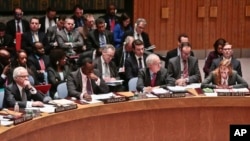UNITED NATIONS —
The U.N. Security Council met on Ukraine Monday for a fifth time in 10 days, as international concerns grow that Russia is getting closer to annexing Ukraine’s Crimea region. Ukraine’s interim prime minister also may come to New York this week to seek U.N. support ahead of Sunday’s referendum.
The 15-nation Council met in a private meeting and was briefed on developments by U.N. political chief Jeffrey Feltman and Ukraine’s U.N. Ambassador Yuriy Sergeyev.
Council president, Luxembourg Ambassador Sylvie Lucas, told reporters after the session that many Council members reiterated the need for a de-escalation of the situation and called for respect for Ukraine’s sovereignty, territorial integrity and political independence.
She said a number of Council members said the decision of the Supreme Council of Crimea to hold a referendum this Sunday on seceding from Ukraine violates the country’s constitution and is, therefore, illegal.
France’s ambassador, Gérard Araud, warned that the situation is worsening by the day.
“The Russian army is reinforcing its presence in Crimea. The Russian army is now besieging and storming installations of the Ukrainian army," he said. "The Ukrainian [television] channels are cut. And now we have this referendum actually organized by Russia.”
He called on Moscow to enter negotiations, saying if Russia annexes Crimea it would be “extremely serious” and negatively impact international relations.
British Ambassador Mark Lyall Grant said Russia is becoming more isolated. He called on Moscow to pull back its troops and let international monitors into Crimea.
“At the same time as Russia claims to be concerned about the threats to Russian speakers in Ukraine and others in Crimea, they are not actually allowing in any international observers -- whose job is precisely to report on what is actually happening,” he said.
He said U.N. political chief Jeffrey Feltman and other observers who have entered Crimea say they have not seen any particular threat to Russian speakers, and that tensions are actually high because of Russia’s military actions.
Ukraine’s Western-backed interim Prime Minister Arseniy Yatsenyuk will be in the United States this week trying to rally support for his government and the restoration of Crimea to Kyiv’s control. He is expected to meet with President Barack Obama Wednesday and come to the United Nations Thursday or Friday.
U.N. Secretary-General Ban Ki-moon expressed his increasing alarm about the situation, saying that events in the Crimea have deepened the crisis. He urged all sides to refrain from “hasty actions and provocative rhetoric.”
Ban dispatched the head of his New York human rights office, Ivan Simonovic, to Kyiv last week. Simonovic has been holding meetings with various players and is expected to travel to the Crimea. Another U.N. envoy, Robert Serry, was threatened by armed men in Crimea last week and forced to leave the region.
The 15-nation Council met in a private meeting and was briefed on developments by U.N. political chief Jeffrey Feltman and Ukraine’s U.N. Ambassador Yuriy Sergeyev.
Council president, Luxembourg Ambassador Sylvie Lucas, told reporters after the session that many Council members reiterated the need for a de-escalation of the situation and called for respect for Ukraine’s sovereignty, territorial integrity and political independence.
She said a number of Council members said the decision of the Supreme Council of Crimea to hold a referendum this Sunday on seceding from Ukraine violates the country’s constitution and is, therefore, illegal.
France’s ambassador, Gérard Araud, warned that the situation is worsening by the day.
“The Russian army is reinforcing its presence in Crimea. The Russian army is now besieging and storming installations of the Ukrainian army," he said. "The Ukrainian [television] channels are cut. And now we have this referendum actually organized by Russia.”
He called on Moscow to enter negotiations, saying if Russia annexes Crimea it would be “extremely serious” and negatively impact international relations.
British Ambassador Mark Lyall Grant said Russia is becoming more isolated. He called on Moscow to pull back its troops and let international monitors into Crimea.
“At the same time as Russia claims to be concerned about the threats to Russian speakers in Ukraine and others in Crimea, they are not actually allowing in any international observers -- whose job is precisely to report on what is actually happening,” he said.
He said U.N. political chief Jeffrey Feltman and other observers who have entered Crimea say they have not seen any particular threat to Russian speakers, and that tensions are actually high because of Russia’s military actions.
Ukraine’s Western-backed interim Prime Minister Arseniy Yatsenyuk will be in the United States this week trying to rally support for his government and the restoration of Crimea to Kyiv’s control. He is expected to meet with President Barack Obama Wednesday and come to the United Nations Thursday or Friday.
U.N. Secretary-General Ban Ki-moon expressed his increasing alarm about the situation, saying that events in the Crimea have deepened the crisis. He urged all sides to refrain from “hasty actions and provocative rhetoric.”
Ban dispatched the head of his New York human rights office, Ivan Simonovic, to Kyiv last week. Simonovic has been holding meetings with various players and is expected to travel to the Crimea. Another U.N. envoy, Robert Serry, was threatened by armed men in Crimea last week and forced to leave the region.




